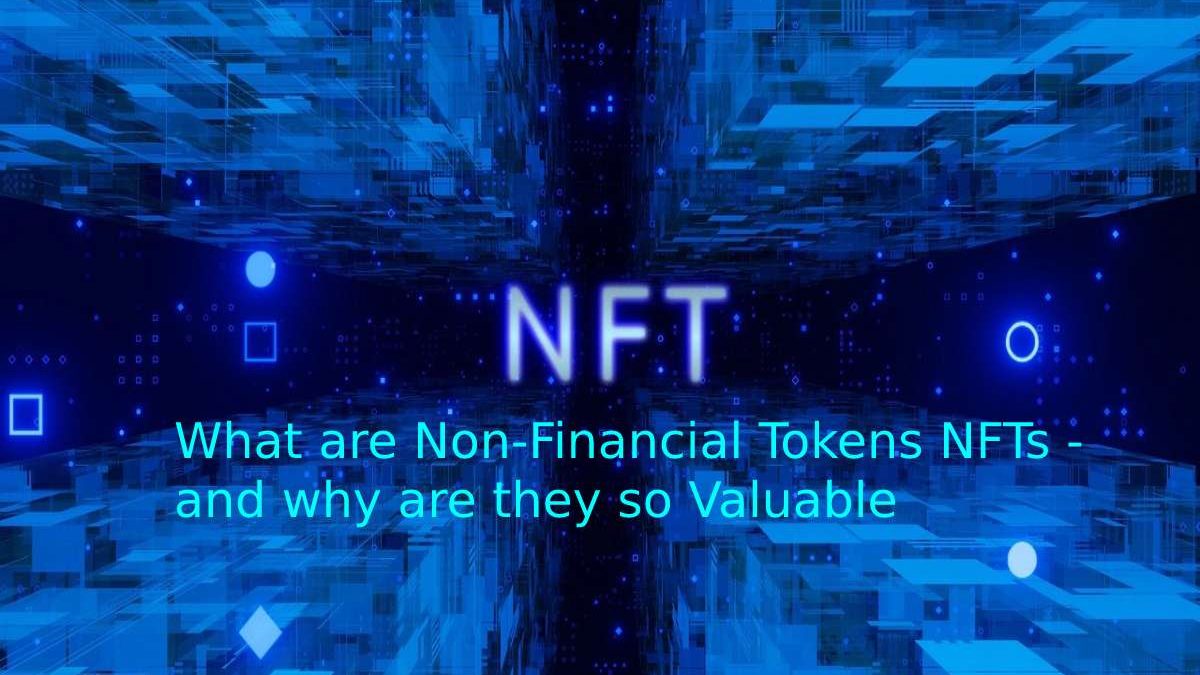Table of Contents
Non-Financial Tokens
Non-Financial Tokens: Let’s start with how NFTs acquire value. Many factors that influence its worth are not related to the artwork itself.
Property Value
For the first time, Non-Financial Tokens NFTs use the blockchain to offer evidence of ownership of digital assets. Each NFT contract has a token identification number and, as a result, the owner’s address. In the Web2 era, determining ownership of digital assets such as artwork or music has always been challenging; for example, someone may right-click and save a picture and claim ownership. But is the photograph the property, even if it exists as a download on your computer?
A piece of art that does not survive in the physical world has been sold at Christie’s auction for US$69 million: the buyer will not receive a sculpture, a painting, or even a copy.
You will receive a digital token (or voucher) known as an NFT.
If bitcoin was hailed as the digital reply to currency, Non-Financial Tokens NFTs are now considered the digital answer to collectibles.
But many skeptics consider it to be a new bubble about to burst.
What is an NFT – Non-Financial Tokens
In finances, a fungible asset is something with units that can be easily exchanged, such as money.
With money, one can exchange a 10-peso bill for two five-peso bills, which will have the same value.
However, if something isn’t expendable, that’s impossible: it means it has unique properties, so it can’t be traded.
It could be a home or a work of art like the Mona Lisa, unique. One could take pictures of the painting or buy a copy, but only one original image will exist.
“If you take a photograph of the original picture with the best possible camera and then use the best painter to reproduce it exactly, it will likely be perfect, but it will never be that of Leonardo da Vinci,” the investor explained to BBC Mundo. American Pablo Rodríguez-Fraile, who sold a video for US$6 million that can be seen for free and whose story we tell here:
NFTs are an inimitable benefit in the digital world to can be bought and sold like any other property type but have no tangible form.
These digital tokens can be unspoken as virtual or physical assets ownership certificates.
How do they Work?
Traditional works of art like paintings are precious because they are unique. But digital files can be easily duplicated over and over again.
With NFTs, art can be tokenized to create a digital certificate of ownership that can be bought and sold. As with cryptocurrencies, a record of who owns what is stored in a shared ledger like the blockchain.
The records cannot be falsified because thousands of computers worldwide maintain the book in question.
NFTs can also contain smart contracts that could provide the artist with, for example, a share of a future sale of the token.
What Stops People from Copying Digital art?
Any. Millions of people have seen the $69 million part of the art by artist Mike Winkelmann, known as Beeple, and the image has been derivative and shared countless times.
In many cases, the artist even retains the copyright to their work so that they can continue to produce and sell copies.
But the NFT buyer owns a token that proves that he is the owner of the “original” work.
Some people compare it to buying a signed copy.
Are people paying millions of dollars for tokens?
Yes. It’s as far-fetched as it sounds.
How much are NFTs valued?
In theory, anyone can tokenize their work to sell as an NFT, but interest has grown in the wake of news of multimillion-dollar sales.
On February 19, a Gif of Nyan Cat, the well-known 2011 meme of a cookie-bodied cat flying, sold for more than $500,000.
A few weeks later, Canadian singer, Grimes sold a collection of digital works for more than $6 million.
Grimes sold a collection of his digital artwork for more than $6 million earlier this month.
But it’s not just art being sold through NFTs.
Twitter founder Jack Dorsey sold his first tweet on the social network for $2.9 million.
How the first tweet in history generated a millionaire auction
And the auction of the Beeple piece, the first digital art ever offered at Christie’s, reached a new record for digital art.
But as with cryptocurrencies, there are concerns about the environmental impact of maintaining the blockchain.
Is it just a Bubble?
A day before the auction, Beeple told the BBC: I think there will be a bubble, to be honest.
And I think we may be in that bubble right now.
Others are even more skeptical.
David Gerard, the author of Attack of the 50-foot Blockchain, stated that he saw NFTs as buying official collector’s items.
Some artists are making money off of this stuff. but you probably won’t, he warned.
The same guys that have always been doing it, trying to find some new kind of worthless magic nugget that they can sell for money.
Charles Allsopp, an auctioneer for Christie’s, said buying NFTs made no sense.
The idea of buying something that isn’t there is just weird. He told the BBC.
I think people who spend on it are a bit silly, but I hope they don’t lose their money.
Also Read: Cloud Storage Services: How could Save Money


